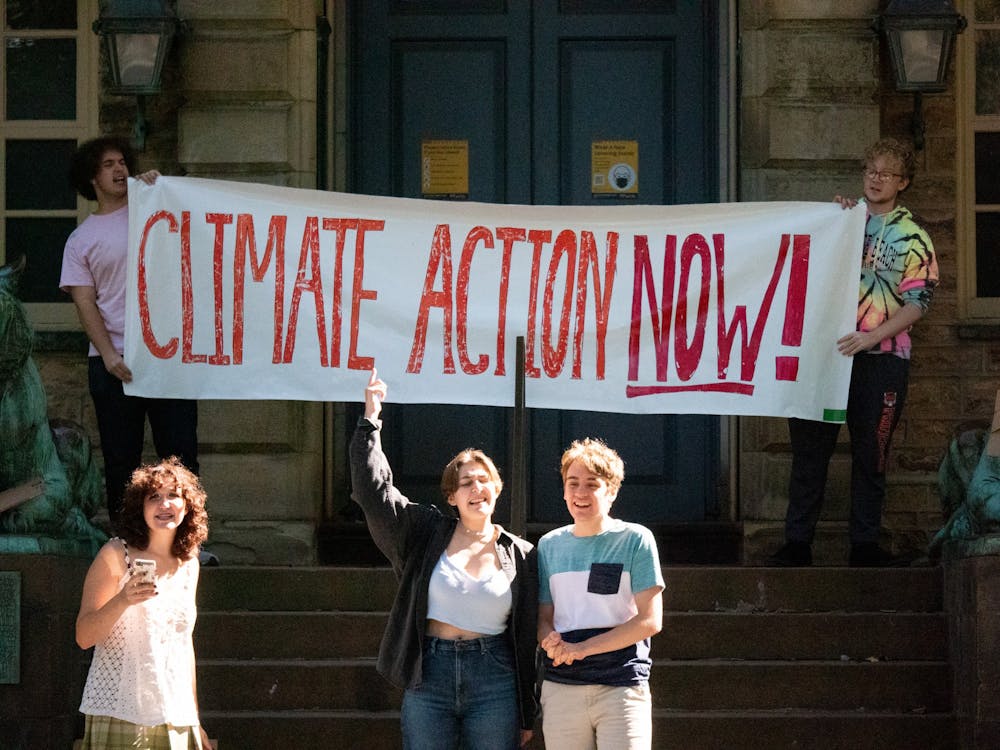The following is a guest contribution and reflects the author’s views alone. For information on how to submit an article to the Opinion Section, click here.
A few weeks ago, the University announced a historic decision that took us by surprise: the University will completely divest from all publicly traded fossil fuel companies — including both direct and indirect investments — and dissociate from 90 fossil fuel companies, including a refusal to accept their research funding. The product of nearly a decade of activism, the University’s announcement opens the door to a long overdue fossil-free campus.
The University engages with fossil fuel companies in three main areas: endowment holdings, research funding, and non-financial relationships, such as on-campus recruiting. The University’s planned dissociation and divestment represents substantial progress in the first two of these areas. We celebrate this symbolic and material victory for our climate.
At the time of the University’s announcement, it held a staggering $1.7 billion in fossil fuel companies, including indirect holdings. Princeton’s pledge to fully divest, including from indirect holdings, is an achievement that, frankly, caught us — Divest Princeton organizers — by surprise.
The University’s commitment to dissociate from 90 fossil fuel companies and to cover any lost research funding is similarly remarkable. Dissociation, per Princeton’s recently reworked definition, entails “refraining, to the greatest extent possible, from any relationships that involve a financial component with a particular company. It includes no longer soliciting or accepting gifts or grants from a company, purchasing the company's products, or forming partnerships with the company that depend upon the exchange of money.”
Through subtly changing the definition of dissociation, exclusively focusing on the financial component of institutional relationships, the University allows for unethical non-financial engagements to persist.
The rejection of research funding from dissociated entities is possibly the most groundbreaking provision of the plan. When funding research projects, fossil fuel companies don’t necessarily determine what results scientists find, but they do influence what subjects scientists study. The industry can pour money into research on wholly insufficient climate solutions like carbon capture and storage and “low-carbon hydrogen,” diverting money, attention, and intellectual resources away from renewable solutions.
When Princeton committed to dissociating from these 90 companies, including ExxonMobil, the University sent a message that they have no place on our campus. And in covering the costs of this dissociation by creating a new research fund, the University took a large step forward towards ensuring our research has the academic integrity and independence it deserves. The University Board of Trustees made clear that Princeton does not need tainted fossil fuel money to conduct its research.

But Princeton’s decision to divest also demonstrates something else: the power that activists hold, if we know how to use it. Although the administration did not acknowledge Divest Princeton, our community knows that divestment happened only because activists demanded it. Our team of students, alumni, staff, and faculty worked together to combat the University’s delay tactics.
Princeton’s attempts to delay divestment were effective because students are only here for a few years. Many of the activists who first submitted a divestment proposal to the Council of the Princeton University Community (CPUC) back in February 2020 have since graduated. Alumni, in particular, have allowed for us to build institutional memory, maintain engagement, and benefit from a historic and long-term perspective. For example, alumni who once organized for the University to divest from apartheid South Africa are an invaluable part of our team.
While Princeton’s current divestment policy makes huge leaps towards addressing the influence of the fossil fuel industry at our University, there is more work to do. First, Princeton must divest the approximately $700 million it will continue to invest in private fossil fuel companies, which are known to be amongst the worst emitters — including Princeton’s own fossil fuel company, Petrotiger (we didn’t make that name up).
Dissociation from fossil fuel companies must extend to include the industry at large, not only 90 of the worst polluters. Additionally, the University should cease all non-financial relationships with those companies, such as recruiting.

We know that the climate crisis requires action at all levels of society. At the state level, New Jersey recently became the eighth and largest state to file a lawsuit against fossil fuel companies for their intentional destruction of our environment and for their lies to the public. Our work at Divest Princeton is just one of many struggles working to end the destructive and ongoing impact of fossil fuels in academia.
At the University of Pennsylvania and other nearby institutions, students are demanding the ivory tower stop legitimizing the fossil fuel industry. Only by exposing their crimes and shunning their influence can we usher in a truly sustainable future. We won’t stop until that happens.
Nate Howard is a sophomore contributing columnist from Princeton, N.J. He is a prospective sociology major and co-coordinator of Divest Princeton. He can be reached at natehoward@princeton.edu.
Alex Norbrook is a first-year from Maryland. He is a member of Divest Princeton and can be reached at alexnorbrook@princeton.edu.








